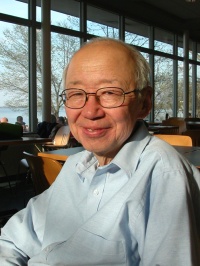Yi-Fu Tuan
From Geography
Contents |
Background
Yi-Fu Tuan was born in 1930 in China. Growing up as a son of a diplomat, he was used to moving places from a very young age. He was educated in China, Australia, the Phillipines and England (Oxford University) and moved to the US in 1951 (University of California, Berkeley). Though he initially began with researching on sediments in southwestern Arizona he became established as a reputed cultural geographer. During his 16 year tenure at the University of Minnesota he produced most of his influential works. From 1984 to his retirement in 1998, he was based at the University of Wisconsin, Madison, maintaining a continued interest in 'systematic humanistic geography'. Over a career spanning around 40 years Tuan has written 15 books and a number of papers known for being reflective and thought-provoking. Though Tuan himself did not work directly inside the intellectual circles in geography his career corresponded to a historical period of change in the discipline itself. (Hubbard, Kitchin, Valentine, 2004, pp 306).
Key contributions (humanistic geography)
While most of his contemporaries were concerned with positivist approaches to spatial analysis in the 1960s, Tuan became increasingly interested in the emotional and intimate engagement of people, culture, environment and place. With the increasing critique to positivist spatial science in the 1970s, Tuan quickly became associated with the 'new geography' which soon emerged as 'humanistic geography'. He redefined understandings of human geography as the study of the human-environment relations (Hubbard, Kitchin, Valentine, 2004, pp 306). He proposed a reflexive approach to studying "topophilia", firmly asserting that to know the world is to know oneself. Tuan is also known to have pioneered the "perspective of experience" to the idea of place (Adams, Hoelscher, Till, 2001)
The importance of the personal, the subjective, the affective and the moral has continued to resonate in his work, which has indirectly inspired many femist geographers to value the personal as it is also political (Hubbard, Kitchin, Valentine, 2004)
Tuan uses two terms to describe human emotions towards place: Topophobia and topohilia. Topophobia means a place where we feel unsafe, 'landscapes of fear', like a place where something terrible happened, when you where there or a cemetery (R. Johnson, 2000, p 840). Topophilia is the love we feel for a certain place. The bond we have with for instance the place where we grew up. These varies from individual to individual and can vary in scale from nation to home.
Approach
Tuan basically absorbed the ideas of existentialism and phenomenological approach to intuitively approach human geographical topics. The experiences and observations of people of their places and environments was used to unravel geographical processes (Cloke, Philo & Sadler, 1991, p. 75). His works have mainly focussed on exploring what it is to be human. A key unifying theme in all his works is seen to be an existential, experiential and holistic concept of the intimate connection between people and places, culture and geography and man's relationship with nature (Hubbard, Kitchin, Valentine, 2004, pp 306-309). Tuan looks not for the order of dots, lines and hexagons but for the meaning a space, a place or an environment possesses because it is a sign to something beyond itself, to its own pas and future, and to other objects (Cloke et all, (1991).
Critique
While Tuan's spatial contributions have been widely read and refereed both within the discipline and beyond, he himself has followed a path that is highly personal, and sometimes known to be idiosycratic explorations of cultural values, attitudes to the environment, space and place, the self and the cosmos, emotional and spiritual geographies. Tuan's humanistic perspective has been criticised, especially since the 1980s, for its tendency to universalize cultural traits, political naivety and sometimes essentialist assumptions. However, the fundamental humility and sense of wonder in his discourse has inspired many both inside and outside the discipline (Hubbard, Kitchin, Valentine, 2004, pp 308).
Important Works
- Tuan, Y-F. (1971) 'Geography, phenomenology and the study of human nature', The Canadian Geographer 15: 181-192
- Tuan, Y-F. (1974) Topophilia: A study of Environmental Perception, Attitudes and Values. Englewood Cliffs, NJ: Prentice Hall
- Tuan, Y-F. (1976) 'Humanistic geography', Annals of the Association of American Geographers 66 (2): 266-276
- Tuan, Y-F. (1977) Space & Place: The Perspective of Experience. Minneapolis: University of Minnesota Press.
- Tuan, Y-F. (1979) Landscapes of Fear. Oxford: Blackwell.
- Tuan, Y-F. (1996) Cosmos & Hearth: A Cosmolite's Viewpoint. Minneapolis: University of Minnesota Press
- Tuan, Y-F. (1998b) Escapism. Baltimore: Johns Hopkins Press.
- Tuan, Y-F. (1999) Who Am I? An Autobiography of Emotion, Mind and Spirit. Madison: University of Wisconsin Press
Useful links
References
- Adams, Paul. C., Hoelscher, Steven.,Till, Karen.E. (2001). Textures of Places: exploring humanist geographers. Regents of the University of Minnesota.
- Cloke, P., Philo, C. & Sadler, D. (1991). Approaching human geography. The Guilford Press: London UK.
- Hubbard, Phil., Kitchin, Rob.,Valentine, Gill. (eds.) (2004). Key Thinkers on Space and Place. Sage: London UK.
- Johnston, R., Gregory, D., Pratt, G. & Watts, M. (2000). The Dictionary of Human Geography. Oxford: Blackwell Publishing Limited
Contributors
- "page created by Boudewijn Idema"
- "page enhanced by Kolar Aparna"--KolarAparna 10:52, 10 September 2011 (UTC)
- "page enhanced by Doris Roelvink"
- "page enhanced by Pieter van Luijk 15 oktober 2012
